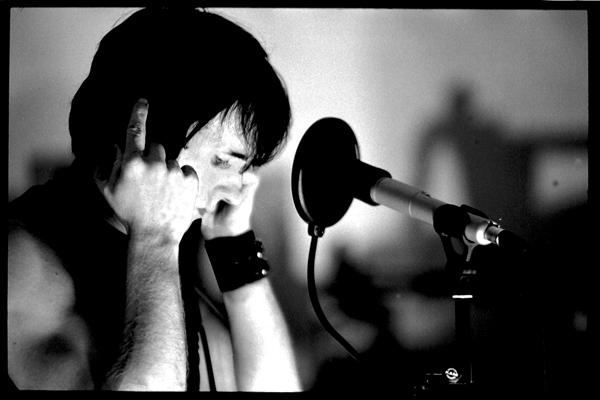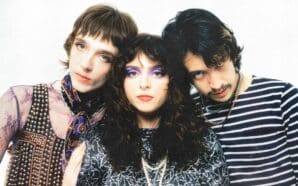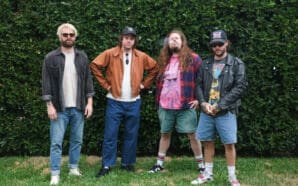Being a music journalist and having been to around a thousand concerts, I’m rarely impressed or excited by anything. However, picking up my phone and hearing “Hello, this is Alec Empire,” did evoke the rush that I experienced as a teen getting to chat with Iggy Pop and Kim Deal (For the record, Alec is exactly what you would expect/hope him to be.) Alec’s status as a hero (although perhaps more regularly regarded as an anti-hero) comes from the fact that he is able to turn heady cultural theory into beautiful, noisy, and abrasive art. He and his Atari Teenage Riot are more or less the Situationist International as an experimental, electronic noise band (or Digital Hardcore, a phrase he has coined). He’s the perfect combination of a transgressive intellectual and a badass motherfucker. We chatted about the current state of the world and the current state of Atari Teenage Riot, who recently released Is This Hyperreal?, their first album in twelve years, and embarked on their first US tour in even more.
This Sunday, September 18th, Atari Teenage Riot will find themselves at Polaris for what I’m guessing will be the most exciting show of the year… although not in the conventional sense. “We’re not entertainers. We don’t perform,” Alec tells me: “Instead of just performing songs off of the album we involve the crowd. We want people to be involved and part of the show.” In addition to stages failing to contain the band themselves, a good ATR show also includes the audience invading the stage in spastic fits of liberation equally resembling a Stooges gig and an exorcism: “When I say energy I really mean that… it’s heavy.”
As their style of performance would suggest, Atari Teenage Riot are the ultimate postmodern band. The raw materials of their latest work are not abstract or universal “ideas” that we all constantly ponder existentially, but whatever the circumstances that make up the present state of society they’re experiencing. However, Alec seems to want to avoid looking at things in a traditionally and explicitly “political” way (which would be the obvious route): “People are so bored and angry with politics that they just don’t want to get involved, which is the wrong stance. Even if you don’t care about politics, you have to understand the system.” He goes on to tell me about how many people he’s seeing, in light of the current global economy having a practical impact on their lives, looking to understand the system for the first time: “Before it affects them, it’s just an abstract example.”
While Atari Teenage Riot’s previous work was concerned with things like “Terrorism, the wars, all the issues [they dealt] with in Germany, back in the day,” Is This Hyperreal? is more concerned with contemporary technology. A number of the songs revolve around the fact that when the internet rose to prominence it promised to be a liberator of the masses, but has proven to be just another tool for the elite to take control and spy on us. However, ATR are no Luddites (at least not in the traditional sense) and since they have returned they have been aggressively appropriating the internet in order to transmit their messages, most prominently in a new brand of music video that they’ve been enthusiastically engaging in: “I like to work with video as a medium and, with the internet, it sits online forever and over time we can add information to it through links.”
Alec characterizes the video for “Blood in My Eyes,” Is This Hyperreal?’s first single, as “Not so much of a music video, but a video message.” Now-full-time band member Nic Endo conceived of and filmed the video for the song, which is the tale of a former internet-induced sex slave getting her revenge in I-Spit-on-Your-Grave fashion. The video itself is essentially a radical (and NSFW) PSA regarding human trafficking. The band are currently putting last-minute touches on their video for upcoming single “Black Flags,” for which they are compiling footage submitted to them by their fans. Historically, black flags have signified a refusal to belong to a particular Nation State, which the band had extended to signify an unwillingness of individuals to view themselves as superior to others based on their national identity. ATR has encouraged fans to submit footage of themselves, lip-synching the song and donning black flags. They’ve gotten quite a few ballsy submissions thus far, including fans lying down in public places with black flags over their heads: “It draws more attention than doing a violent protest.” (Alec Empire is not the kind of person I have ever once thought of as preaching non-violence… but I guess that’s age for ya.)
For long-time fans (which there are apparently less and less of, in lieu of the new ones), Atari Teenage Riot is likely looking (and sounding) a little different. Former collaborator, Nic Endo, has joined the band full-time, unintentionally taking Hanin Elias’role as female vocalist and MC KidtroniK is the band’s new MC, with Carl Crack’s passing in 2001. Although, it all happened in a far more haphazard way than it sounds. “It was totally not planned like that,” Alec tells me: “Hanin Elias sent me a message on Facebook… because we hadn’t talked in like a decade,” (Does anyone else find this as brilliant and hilarious as I do?) “We thought it was going to be me, Nic, and Hanin.” Unfortunately, at the last minute, Hanin acquired vocal trouble and was ultimately unable to perform with the band for their reunited dates. As for KidtroniK, he was admirably determined to get himself into the band, despite Alec’s original hesitation, jokingly telling him “People are just going to hate you because Carl Crack died and he was such a powerful figure.” (And, I’m only assuming, the underlying concern that it would be perceived as the band’s attempt to ‘swap out one black guy for another.’) However, it was when KidtroniK began bringing his own vocals (And ultimately, politics) into the mix (re-working certain “classics”) that Alec began to get on board, considering that would at least make a “legitimate” lineup: “Even if people hated it, it would at least matter.” Has this impacted the band’s sound? Alec and his friends seem to think so (some even going so far as to say that they sound like a new band). He characterizes their recent music as having a synthesizer-heavy ‘80s dance feel to it… My take on it?: Maybe… but it’s still a long fuckin’ way from Depeche Mode.










